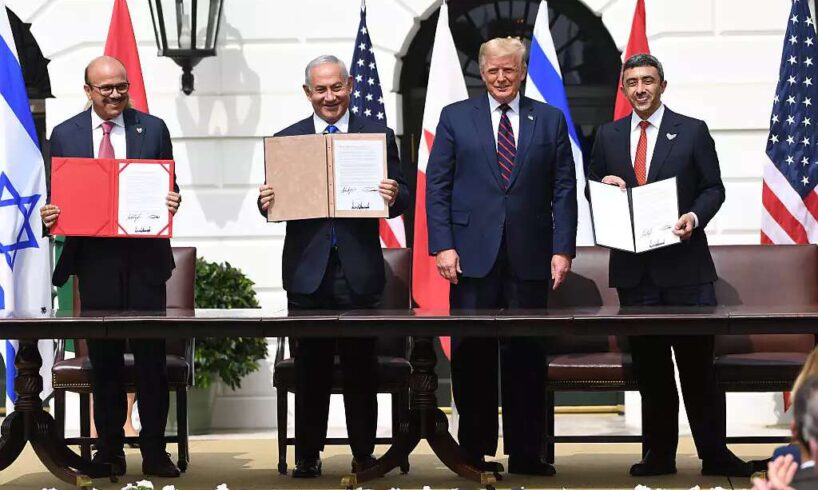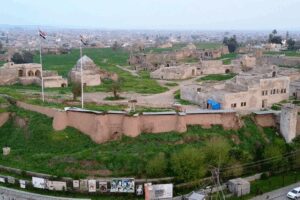
What are the chances that Israel’s peace agreements with Arab states can withstand an intense multi-front war that brings tens of thousands of Palestinian deaths, hundreds of thousands wounded and displaced, and unprecedented destruction in Gaza? Two years ago, the likely answer would have been: none.
The reality turned out differently. Relations held firm despite images from Gaza, accusations of a “starvation campaign,” and an international smear campaign against Israel. From the outset of the war, the Abraham Accords countries signaled their intent to maintain ties with Israel and not allow Hamas to sabotage them. They were among the first to publicly condemn the terrorist organization for its October 7 massacre.
The Gaza border fence is breached by Hamas bulldozers on October 7 Arab Networks
UAE President Sheikh Mohammed bin Zayed met with Israeli President Isaac Herzog on the sidelines of the climate summit in Dubai; Israeli ministers of economy, energy, and strategic affairs paid public visits and met with their counterparts; the IDF chief of staff attended a summit in Bahrain, while a delegation of Israeli rabbis visited Morocco.
Security cooperation deepened, and it is reasonable to assume it contributed to thwarting attacks on Israel throughout the war. Defense and civilian trade grew in 2024, similar to levels in 2023. Investment in Israeli high-tech continued. Tourism was affected by widespread reserve call-ups, aviation security restrictions, and growing concerns over attacks on Israelis, but it did not stop. Other ties remained intact, albeit at a lower public profile, with fewer meetings, fewer statements, and less fanfare.
The war’s negative impact on public opinion in those countries cannot be denied. Even before Israel’s strike in Qatar, Hamas’ propaganda campaign had severely damaged Israel’s image and expressions of solidarity. Still, those states understand that Israel’s war serves their core interest against their most dangerous foes: Iran and its proxies, and on the Sunni side, the Muslim Brotherhood and jihadist movements. For them, lowering the profile and slowing progress is a necessity, but they hope it will be temporary.
Ankara and Doha’s agenda
Turkey and Qatar, the main sponsors of the Muslim Brotherhood, hold ideological positions opposed to Israel’s integration in the region and have ambitious aspirations to expand their influence. They invest heavily in this effort, profiting from their ability to present themselves as mediators. The collapse of the Iranian-led Shiite axis created a vacuum they are rushing to fill.
Erdoğan at a ceremony marking the Turkish invasion of Cyprus. Photo: AP AP
It is no coincidence that both were the first to reopen embassies in Damascus under the rule of Abu Muhammad al-Jolani, and to push for international recognition and Syrian reconstruction.
Syria? Not a partner yet
The idea of Damascus joining the Abraham Accords is wishful thinking. The suited jihadist ruler has spoken positively about peace with Israel, which is noteworthy, but so far it is only rhetoric.
Dr. Al-Sharaa and Mr. Al-Julani. Photo: EPA
Meanwhile, the brutal displays in his fractured state reveal his true character. Even those who believe that Ahmad al-Sharaa has moved on from jihadism and become a statesman would struggle to assume that his circle has abandoned its dream of building a radical Sunni theocracy.
The Muslim Brotherhood challenge
To counter the disruptive influence of Turkey and Qatar and build legitimacy for expanding and deepening the Abraham Accords, the Muslim Brotherhood must also be addressed. It is unlikely Washington will lead such a move while trying to appease Doha after Israel’s strike there. In any case, such a designation would be a long and complex legal process, as US Secretary of State Marco Rubio recently explained.
This is not the first time the issue has been considered at the State Department. It would be a significant step toward a better Middle East. Only this May, Jordan outlawed the Brotherhood after uncovering a terror network run by the movement. It joined Egypt, Saudi Arabia, and others that have faced the dangers of the Brotherhood and curbed its activity.
Those who still view the Brotherhood as merely a stream of “political Islam” offering a Sunni alternative to global jihadist organizations forget that its ideology is born of the same doctrine, applied by the same methods. Hamas demonstrated this clearly on October 7.
For US policymakers, pushing for such a designation will be a serious challenge, given America’s sensitive ties with Turkey and Qatar. But it would have a positive effect on normalization prospects with Saudi Arabia and ease internal pressure from Brotherhood-inspired opposition against states that have formal ties with Israel or are considering them.
The Houthi obstacle
Another barrier to realizing the full potential of the Abraham Accords is the Houthis. They control the Bab el-Mandeb Strait, one of the world’s most vital maritime choke points. Their activity has disrupted shipping in the Red Sea, raised transportation and insurance costs, and harmed global supply chains. Beyond economic losses worth hundreds of billions of dollars, their actions reinforce the perception of an old Middle East threatened by an Iranian-backed neighborhood bully.
Houthi troops in Yemen. Photo: EPA
Washington seems to believe the Houthis will quiet down once the Gaza war ends, and so it focuses its efforts on ending the war. But it is far from clear that this is the Houthis’ view, even after Israel decapitated their leadership. Even if quiet comes, they will remain a regional threat, with the next clash only postponed. Sooner or later, there will need to be a US-led international campaign to eliminate them. For those citing their survival as proof against confronting them, history shows what happens when Washington truly decides to act: Saddam Hussein, Muammar Gaddafi, Osama bin Laden, and Abu Bakr al-Baghdadi all ended the same way.
The Palestinian problem
Thirty-two years after the signing of the Oslo Declaration of Principles, which led to its creation, the Palestinian Authority is on its deathbed. Even French President Emmanuel Macron’s initiative to recognize it as a state offers no revival. It is corrupt, inept, and supportive of terrorism. Prime Minister Mohammad Shtayyeh described Hamas’ October 7 massacre as “a daring, unprecedented action, an important turning point in the history of the Palestinian struggle.”
Macron in historic announcement: France will recognize a Palestinian state. Photo: EPA/AFP/Reuters EPA/AFP/Reuters
Israel will need to explore alternative paradigms beyond those repeatedly tried and failed in resolving the conflict. Macron’s declaration, and Israel’s possible responses, will add to the pressures on the Abraham Accords countries, especially the UAE. Israeli policymakers will need to factor this into their reactions.
The Abraham Accords shattered the notion that normalization with Israel was impossible without first solving the Palestinian issue. That issue still weighs heavily in Arab states’ considerations, but letting it dictate policy only strengthens the enemies of peace.
Will we forever live by the sword?
The vision of peace still beats within us, deeply rooted in our hearts, minds, and prayers. But our yearning must not become an intoxicating illusion. True peace will come only after the forces of evil are defeated and lose hope, or alongside continued war against them, as is the case today with the Abraham Accords countries.





